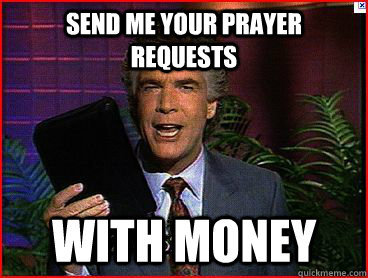Money. Some pastors love preaching about it. Some brag about buying “not one jet, but two!” with cash. Others, because of the first group, hate preaching about it. They don’t want to be associated with the money-mongers. It’s unfortunate because Jesus set the example for preaching about money (and while the TV evangelistis would probably tell you the same thing, they would never tell you all that Jesus said about money).
Luke 3.14
Soldiers also asked [John the Baptist], “And we, what shall we do?” And he said to them, “Do not extort money from anyone by threats or by false accusation, and be content with your wages.”
Luke 16.13-15
“‘No servant can serve two masters, for either he will hate the one and love the other, or he will be devoted to the one and despise the other. You cannot serve God and money.’ The Pharisees, who were lovers of money, heard all these things, and they ridiculed him. And he said to them, ‘You are those who justify yourselves before men, but God knows your hearts. For what is exalted among men is an abomination in the sight of God.’”
Other examples could be given, especially that of the other side (16.1-9). And perhaps I’ll write on this too one day soon, but for now I’ll focus on the task at hand. If wealth could have ever been an idol, more so than in ancient Rome, it’s today. We have the “American dream.” Work hard enough and you can get anything. You can work your way up to the top. There are magnitudes of amounts of ways now to make money (whether they work or not is a different story).
Commercials abound and try work their magic to give you the sense that your life will be worse if you don’t have this toy, computer, and this house, or if you’re not listening to this music or watching these movies, or if you don’t have this beach body, or if you can’t do these awesome tricks or tell these incredible jokes, or especially if you’re not taking this medicine taken from this long-extinct but recently discovered skunk (with 3 easy payments of $39.99!). (Speaking of commercials, Norway barely has them! They’re usually at the end of the TV program, and they’re not very long either).
About this lifestyle DeSilva says,
Because of the idolization of the abundance of wealth, however, even people in the Western world who live at a level far above the well-to-do in third-world countries consider themselves and are looked upon by others as ‘poor’. Within a culture that claims ‘more for me’ it is difficult even to hear Luke’s word ‘share with all’ (345).
Zacchaeus, You Come Down
I like the Zacchaeus story in Lk 19.1-10. In 19.8 Zacchaeus says to Jesus, “Behold, Lord, the half of my goods I give to the poor. And if I have defrauded anyone of anything, I restore it fourfold.” The odds are that for many of us, we wish someone would say this to Jesus too, and that we would be the receivers. Somewhere down the line someone has stolen money from us, and we hope we get it back. Who cares that Jesus came to “seek and to save the lost” (19.10) and that salvation has come to Zacc’s house (19.9)? What about my money?
Before an individual can respond to the Gospel like Zacchaeus, he or she must unlearn the definitions of enough and sufficient that our society offers (if it understands these words at all) and learn a definition that is truly in keeping with human need rather than human wants and expectations. This is a difficult task when the entire advertising industry lives by training us to “need” more. We must learn that to love our neighbor as ourselves, we must use our possessions as much for our neighbor’s good as for our own (345).
Why did salvation come to Zacchaeus just because he gave money away? Because unlike the rich ruler (18.18-30), Zacchaeus not only promised to give money back (19.8), but he even began to follow Jesus (19.6).
Long Division
Throughout his Gospel Luke shows us how divisive money can be:
- The hoarding of wealth cut off the rich man from Lazarus because the rich man valued money more than the life of his neighbor [16.19-31].
- Covetousness over an inheritance pitted one sibling against another (Lk 12:13–15)—they valued money more than kinship.
- For years Zacchaeus was cut off from his fellow Jews on account of his valuing of money over solidarity with his people [19.1-10] (345).
The Solution
What is Luke’s solution? The money comes from, and belongs to, the Lord.
A Christian’s wealth belongs to the Lord, to be used as the Lord directs for the good of all rather than the good of the “owner”. This attitude enabled the quality of fellowship found in the early church, the realization of God’s desires for human community (Acts 2:42–47; 4:32–37). Ultimately the true good of the one can only be achieved in concert with the good of all (345).



Reblogged this on Talmidimblogging.
LikeLike